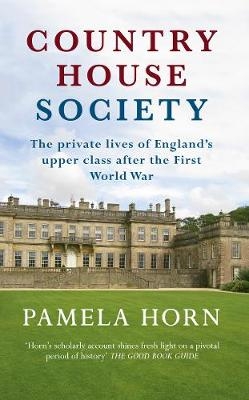
Country House Society
The Private Lives of England's Upper Class After the First World War
Seiten
2015
Amberley Publishing (Verlag)
978-1-4456-4477-6 (ISBN)
Amberley Publishing (Verlag)
978-1-4456-4477-6 (ISBN)
Forget glossy period dramas, here is the real story of Britain's super-rich from the First World War to the end of the 'roaring' twenties.
The First World War particularly affected the landed classes with their long military tradition; country houses were turned into military hospitals and convalescent homes, while many of the menfolk were killed or badly injured in the hostilities.
When the war ended efforts were made to return to the pre-war world. Pleasure-seeking in night-clubs, sporting events and country-house weekends became the order of the day. Many of the former rituals, such as presentation at Court for debutantes, were revived.
Yet, overshadowing all were the economic pressures of the decade as increased taxation, death duties and declining farm rentals reduced landed incomes. Some owners sold their mansions or land to newly enriched businessmen. Others turned to city directorships to make ends meet or, in the case of the women, ran dress shops and other small businesses.
The 1920s proved a decade of flux for High Society, with the lighthearted antics of the ‘Bright Young People’ contrasting with the financial anxieties and problems faced by their parents’ generation. Pamela Horn draws on the letters and diaries of iconic figures of the period, such as Nancy Mitford and Barbara Cartland, to give an insight into this new post-war era.
The First World War particularly affected the landed classes with their long military tradition; country houses were turned into military hospitals and convalescent homes, while many of the menfolk were killed or badly injured in the hostilities.
When the war ended efforts were made to return to the pre-war world. Pleasure-seeking in night-clubs, sporting events and country-house weekends became the order of the day. Many of the former rituals, such as presentation at Court for debutantes, were revived.
Yet, overshadowing all were the economic pressures of the decade as increased taxation, death duties and declining farm rentals reduced landed incomes. Some owners sold their mansions or land to newly enriched businessmen. Others turned to city directorships to make ends meet or, in the case of the women, ran dress shops and other small businesses.
The 1920s proved a decade of flux for High Society, with the lighthearted antics of the ‘Bright Young People’ contrasting with the financial anxieties and problems faced by their parents’ generation. Pamela Horn draws on the letters and diaries of iconic figures of the period, such as Nancy Mitford and Barbara Cartland, to give an insight into this new post-war era.
Dr Pamela Horn lectured in economic and social history at Oxford Polytechnic, (now Oxford Brookes University), for over twenty years. She had written a number of books on social history topics covering the nineteenth- and early twentieth-century life. That includes several books on child life and schooling during the Victorian and Edwardian eras. Pamela sadly passed away in 2014.
| Erscheint lt. Verlag | 15.2.2015 |
|---|---|
| Zusatzinfo | 30 Illustrations |
| Verlagsort | Chalford |
| Sprache | englisch |
| Maße | 124 x 198 mm |
| Gewicht | 231 g |
| Themenwelt | Geschichte ► Allgemeine Geschichte ► Neuzeit (bis 1918) |
| Geschichte ► Allgemeine Geschichte ► 1918 bis 1945 | |
| Geisteswissenschaften ► Geschichte ► Regional- / Ländergeschichte | |
| Geschichte ► Teilgebiete der Geschichte ► Kulturgeschichte | |
| Geschichte ► Teilgebiete der Geschichte ► Sozialgeschichte | |
| Sozialwissenschaften ► Soziologie | |
| ISBN-10 | 1-4456-4477-0 / 1445644770 |
| ISBN-13 | 978-1-4456-4477-6 / 9781445644776 |
| Zustand | Neuware |
| Haben Sie eine Frage zum Produkt? |
Mehr entdecken
aus dem Bereich
aus dem Bereich
Europa 1848/49 und der Kampf für eine neue Welt
Buch | Hardcover (2023)
DVA (Verlag)
CHF 67,20
Giordano Bruno - ein ketzerisches Leben
Buch | Hardcover (2024)
C.H.Beck (Verlag)
CHF 41,85


